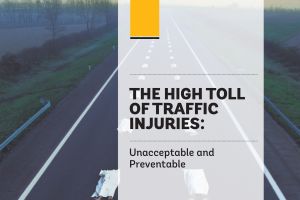
Overview
The sheer scale of health losses from road crashes makes road safety a development priority for the health and transport sectors of low and middle-income countries (LMICs). Poorer population groups bear a disproportionate burden of these health losses which are generally influenced by socioeconomic factors and other social and environmental determinants, and increasing emphasis is being placed on global health promotion and equity as a core, crosscutting development strategy.
Country development aims to promote higher living standards for all, with an emphasis on improved health, education, and people’s ability to participate in the economy and society. Improving road safety in LMICs contributes to the achievement of these development goals by addressing the vulnerability of citizens to catastrophic death and injury arising from road crashes – especially the poor and those thrust into poverty as a consequence – and requires large-scale investments in infrastructure, institutions, vehicle fleets and the health and wellbeing of individuals.
Effective road safety strategies can also help address other global development goals by contributing to lowercarbon transport systems and reductions in non-communicable diseases (NCDs) through cleaner air and more physically active populations. Hence health promotion and equity efforts addressing road safety priorities should be strongly linked and integrated with related global initiatives addressing sustainable transport, NCDs, and the social and environmental determinants of health.
Country health and transport sectors face complex challenges in this development process. Effective strategies demand considerable resources, as weak road safety management capacity in LMICs remains a formidable barrier to success. LMICs face historically unprecedented rates of motorization and levels of vulnerability on their roads and they can ill-afford to emulate the long and costly pathway taken by high-income countries to bring their road safety performance sustainably under control. Scaled-up, intensive, and sustained action is crucial at the country level.
Report Details
Improving Global Road Safety: Towards Equitable and Sustainable Development
Did you know?
82% of Road Crash Fatalities and Injuries in the economically productive age groups (15 - 64 years.)
82% of Road Crash Fatalities and Injuries in the economically productive age groups (15 - 64 years.)


